Best Brush Cutter - Reviews & Buyers Guide 2022
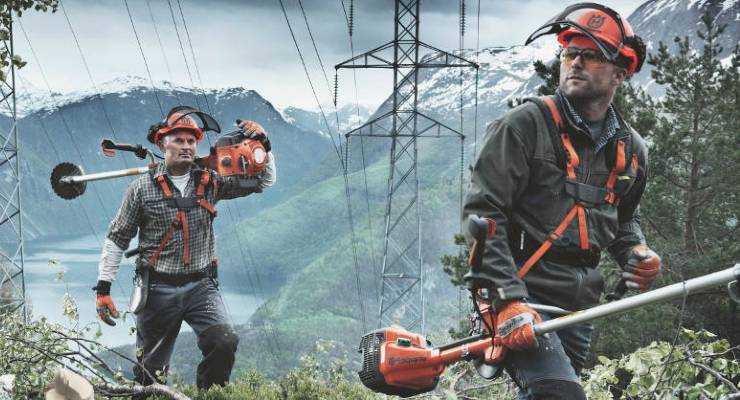
When it comes to maintaining a yard, there’s a lot of tools to bring to the table. But if you live near a forested area or have trouble with thick weeds, a heavy duty brush cutter is one of the most valuable.
These grass cutting tools, sometimes referred to as a whipper snipper, are essentially bigg string trimmers with a powerful engine and metal blades able to take care of thick brush. This article will cover some of the best brush cutter products available, and how you should go about choosing a brush trimmer for your specific needs.
Top 5 Best Brush Cutter Reviews
Husqvarna 336FR Pro Brush Cutter
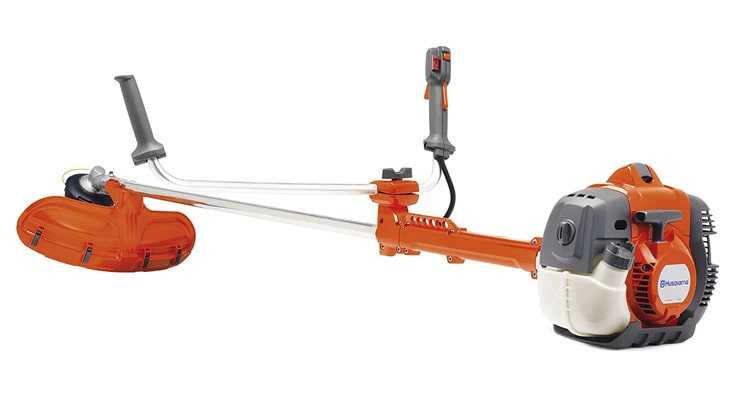
What makes this brush cutter great is the fact that it comes with many attachments for various tasks.
This Husqvarna 336FR Brush Cutter has a trimmer head, a grass blade, and a saw blade, which is useful for anyone that needs a lot of versatility in a tool. Why settle for the best weed cutter when you can have a grass cutter at the same time?
It comes with an ergonomic harness to evenly distribute the weight of the brush cutter, as well as an ergonomic handle to make maneuvering the tool more comfortable.
On top of this, the X-Torq engine design used in the brush cutter optimizes fuel economy and reduces harmful emissions, useful for anyone with green on their mind.
The 336FR Husqvarna brush cutter has many quality of life features to make it easier to use as well.
This includes a system that removes air from the carburetor and the stop switch automatically returning to the start position when the brush cutter is not in use, both of which make for easier startups.
Ultimately, the combination of convenient features, ergonomic design and multiple blades makes this brush cutter well worth the price: never mind the fact that it can be a string trimmer as well.
- Includes a clearing saw
- 2 in 1 Function as a string trimmer or brush cutter
- X-Torq engine has enough power to take care of nearly any brush cutting task
- Ergonomic harness and handle makes it easy to use and control
- Optimally designed to make it easy to get to hard to reach places
- According to customers, the assembly manual isn't very intuitive
- Some customers have reported noteworthy shipping issues
Makita 4-Stroke Brush Cutter
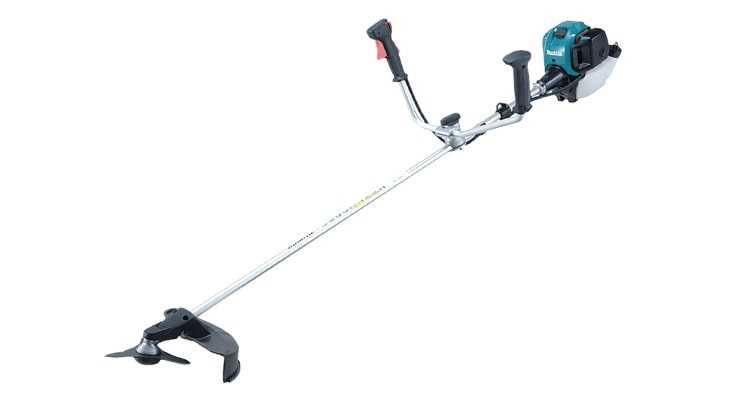
The Makita 4-Stroke Brush Cutter is a lightweight brush cutter that is ideal for cutting any pesky weed or unruly grass, as it is very easy to maneuver.
Moreover, it has a multi-position lubrication system, which allows you to incline the engine at any angle while working.
Naturally this makes it much easier to use a brush cutter to get to those hard to reach places.
It comes with a brush cutter blade cutting thick brush and tree saplings, and the steel drive shaft is durable and guaranteed to last a long time when treated properly.
The Makita 4-Stroke bladed brush cutter also has many nifty features that make it more convenient to use. This includes an easily accessible oil drain port and plug and a view window to easily check oil levels.
The air filter and sealing units are also easily accessible and replaceable.
All in all, the combination of light weight, multiple positioning options and convenient features makes the Makita 4-Stroke brush cutter an excellent tool and one of the best brush cutters available.
- Very lightweight at about 12 pounds
- The blade is ideal for cutting thick weeds
- Can be used at many angles to reach difficult places
- Has many features that make it easy to use and maintain
- Default blade isn't the most powerful and rugged
Remington RM2700 Ranchero Brush Cutter
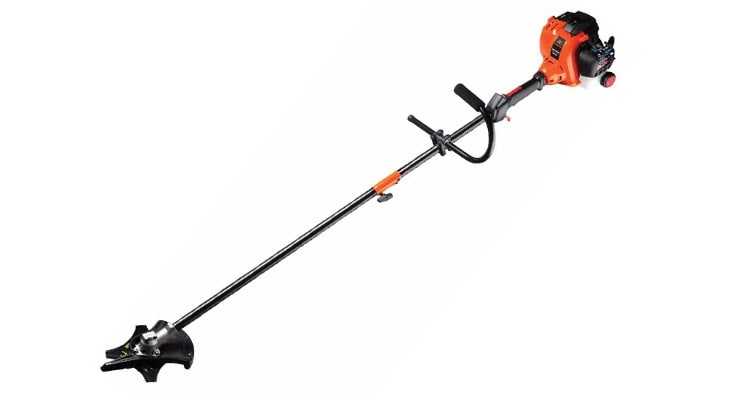
Definitely one of the more affordable options, this brush cutter from Remington still delivers on multiple fronts.
For its small weight of approximately 14 pounds, it still has a powerful engine in its 27cc full crank 2 cycle gas engine.
An adjustable J-handle and shoulder strap reduces user fatigue and makes this brush cutter easy to handle and use.
While it doesn’t come with the parts to make it a string trimmer or grass cutting tool, it is built to easily accept attachments, which will allow you to turn the brush cutter into a trimmer, blower, or many other useful tools, with just as much power as the brush cutter option.
The straight shaft design of this brush cutter makes it easy to handle when going for difficult spots, like under bushes, and it comes with quick start technology that makes it easier to crank every time.
Eventually, the large bump feed trimmer head is easy to use and makes whatever job you are tackling a cinch.
On the other hand, cutter reviews for this product reveals that many customers don’t think it is a good fit for heavy duty work, which is worth considering.
However, if you only have a small bit of land to maintain and your weeds aren’t absurdly thick, this inexpensive brush cutter option is a great choice.
- One of the most inexpensive cutters on this list
- Easy to add or remove attachments to this brush cutter
- Straight shaft design makes it easy to reach difficult spots
- Relatively lightweight compared to most cutters
- Isn't the best choice for extremely heavy duty work
- Some of the brush cutter reviews mention issues with the string mechanism
Proyama 5-in-1 Brush Cutter
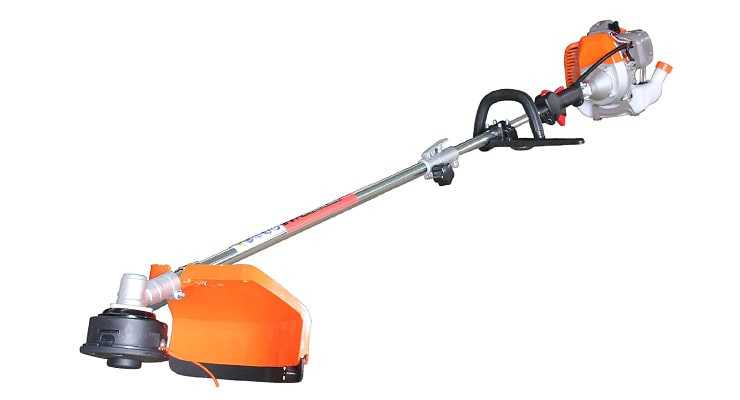
Another one of those brush cutters with multiple functionality, this tool is extremely versatile and still relatively affordable.
The Proyama 5-in-1 Brush Cutter can function as a string trimmer, a brush cutter, a hedge trimmer, and even a pole saw. This level of versatility is why we consider it one of the best brush cutters out there.
This is compounded by its 2 HP 42.7cc engine, which is EPA certified to have reduced emissions.
The pole saw extension can be as long as 11 feet with 12 inch cutting length, and there’s a lot more power in the gas engine than an electric one, so cutting through tree limbs is no great feat.
On top of all these great features, this product comes with not just one, but multiple additional extras, including a shoulder harness, face shield, gloves and ear protectors, as well as a tool kit, a mixing bottle and a chainsaw bar carrier.
It gets all of that while still being cheaper than a lot of other brushcutters, and even then there is still a one year warranty to consider, so if you do have any problems getting it taken care of isn’t a big deal.
To sum up, the Proyama 5-in-1 Brush Cutter is a good option for those that need one tool to handle multiple tasks. It fits in as one of the best brush cutters thanks to its versatility and reasonable price.
- Multiple attachments lets this one brush cutter handle many tasks
- Has a fair deal of power thanks to its quality engine
- Comes with a one-year warranty
- The weight of the tool is not particularly well-balanced: not very easy to maneuver
- Is not small and is definitely on the heavier side compared to most cutters
Blue Max 52623 Brush Cutter
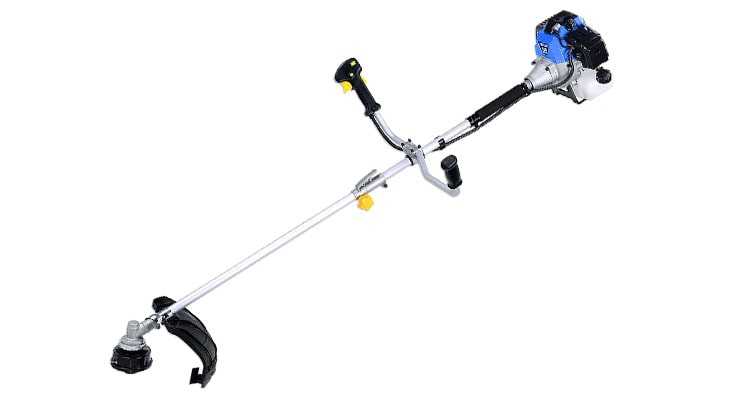
This straight shaft 2-in-1 machine is one of the better brush cutters out there due to a combination of affordability and versatility.
While it’s no 5-in-1 tool, it is a good string trimmer and light brush cutter.
Right out the gate though, let us say it isn’t suited for heavy duty brush: weeds are shrubs fine, but don’t expect it to cut down a tree sapling. It’s a bit too small for that, and also lacks the power.
However, if all you need is a light string trimmer, then it is a pretty solid choice, for a variety of reasons.
The straight shaft is anti-vibration and capable of using multiple attachments.
The 2-stroke recoil starting system makes it easy to crank when you need to, and the spool head itself is very lightweight.
Of course, the entirety of the cutter is not so lightweight at 17 pounds.
As said previously, the cutter isn’t designed to use against heavy duty brush, but that’s only with the default blade.
The engine itself has a lot of power and if you replace the blades with some sturdier models, they’ll definitely cut through even two or three inch tree saplings.
Considering that this is the most affordable option on this list, that’s not a bad deal at all, and definitely cements this product’s place as one of the best brush cutters.
- The straight shaft is anti vibration and can mount many attachments
- Functions as a shrub and string trimmer
- The engine has great power and can cut thicker things with better blades
- Is relatively small and easy to handle despite being slightly heavier than some brush cutters
- Some reviews claim the shoulder strap isn't the highest quality
Buyer’s Guide
Alright, so now you’ve seen some of the top brush cutters out there. But how do you choose the right one for you, especially if you are looking beyond this five models? This Buyer’s Guide will cover all the things you need to consider when shopping for brush cutters.
What is a Brush Cutter?
A brush cutter is a tool not at all dissimilar from an electric weed eater or a cordless string trimmer. It’s pretty much a long pole with a cutting tool on one end and an engine on the other.
But a good brush cutter is different from those other tools in the sense that it almost always uses a metal blade instead of a nylon trimmer line.
Some brush cutters can attach parts to function as a string trimmer, but their default configuration is always a metal blade, which allows you to cut through thicker brush, like vines, shrubbery and even small tree saplings.
Needless to say, if you have thick brush on your property you know a string trimmer can’t handle, then you likely need a brush cutter.
What are the Types of Brush Cutters?
There are many types of brush cutters out there.
Hand-held Brush Cutter
All of the ones on this list were hand-held models, meaning you carry them yourself, generally with the aid of a harness or some such. As you might imagine, these are the smallest models and have the least amount of power.
Walk-behind Brush Cutter
Next is the push or walk-behind brush cutter, which functions almost identically to a push lawnmower. It has four wheels, a big engine and blades on the bottom, and all you have to do is push it around and run over suitable targets. The bigger frame means more power than a hand-held brush cutter, so it can handle tougher obstacles.
For even heavier tasks, or you simple want to lessen the physical work and save your back, you can opt for one of the best walk behind brush cutters but may need to for out some extra dollars.
Tow-behind Brush Cutter
Finally you have the tow-behind brush cutters. These function like trailers that you would attach to the rear of a riding mower, ATV or UTV. It usually has a much wider cutting area than the other options and can have an even bigger engine for more power.
Naturally, the size and scope of the area you need to take care of is the most important factor in which one of these is right for you.
2-Stroke vs 4-Stroke Brush Cutters
However, one also needs to consider the engine, of which there are several types regardless of which type of brush cutter you get.
Brush cutters use either a two-stroke or a four-stroke engine.
We won’t get too complicated here: put simply, a two-stroke engine has a faster combustion cycle (in two strokes, coincidentally) whereas a four-stroke engine has a slower but more efficient combustion cycle.
A two-stroke engine requires a specific air fuel mixture that may be more expensive, whereas a four-stroke engine doesn’t because it is built to create the needed mixture within the engine. In general, a two-stroke engine provides more power and weighs less, but is noisier and less fuel-efficient.
Four-stroke engines are more fuel efficient and quieter, but have less power and weigh more. However, because of the less vigorous combustion process, four-stroke engines generally last longer as well.
Keep in mind that the quality of an engine is mostly dependent on how much money is put into it, not whether or not it is a two or four stroke.
As for how much power you need, that depends on what you are cutting. Any brush cutter can go through weeds, but you’ll need more power to cut tree saplings.
What Features Should You Look for in a Brush Cutter?
This is the list of things you should consider when shopping for the best brush cutter.
Extra Features
Always pay attention to any special features a product has that isn’t typical. This includes convenient features like an oil viewing window and quick start functionality, or a reduced emissions engine.
Every brush cutter will do its main job, but extra features are a great addition to any tool.
Handles
If you are getting a hand-held brush cutter, the handle is very important since you’ll have to carry it around for use. You’ll want a handle that is comfortable in the hand and wont’ cause undue strain.
If you want to carry your brush cutter in a certain way, you may need handles that allow you to do that. Brush cutters come with many different handles, so look around for one that fits your needs.
Shaft
Most brush cutters are straight shaft models, which allows you to reach tough places, like under bushes. But there are some models with flexible shafts or with different shapes.
If you plan on tackling hard to reach spots, straight shafts are better since you can maneuver them into more positions with less hassle.
Heads
Generally, a brush cutter should have a head with a metal blade, and most do. But some use nylon strings instead, which you don’t want.
That said, most brush cutters can have their heads replaced with one of your choosing. That means the default head of a product isn’t quite as important as some of these other factors.
Deflector
The deflector is very important because it protects the user from flying debris. You don’t want rocks or tough wood flying at you at high speed.
These deflectors can be made of many materials, but metal is without a doubt the best choice. It may be a little heavier, but it will protect you the best.
Blades
The blades are the most important part of the brush cutter, since they do all the work. Unfortunately it’s difficult to tell how good blades are when looking at a product online.
This is why you should look at customer reviews and see if blade issues are mentioned. That said, keep in mind that blades can often be replaced with ones of your choosing, so the default blades aren’t utterly crucial.
Low Vibration
Brush cutters that vibrate a lot are going to tire you out real fast. There’s no such thing as a brush cutter that doesn’t vibrate at all, but there are models designed to reduce vibration as much as possible. You should always look for a model that has anti-vibration features.
Attachments
Many brush cutters can have attachments that change how they function. Usually, you’ll be able to change the head so that it can cut different types of brush. When shopping for a brush cutter, you should either find one that comes with many attachments or one that is at least compatible with many attachments.
Multi-Purpose Features
This ties into the attachments section. A brush cutter with multiple attachments can serve multiple purposes, and has more versatility than a brush cutter with only one function.
How to Use a Brush Cutter
A hand-held brush cutter isn’t much different from a weed eater or string trimmer. At the end of the day it is a blade on the end of a metal stick, so using it is pretty intuitive. All you have to do is hold the tool at the angle you want to cut the target and proceed to do so.
Cutting grass and weeds is as simple as that.
When it comes to shrubbery and tree saplings, you have to use the proper type of blade. Generally, shrub blades need more than eight teeth and tree sapling blades need more than 40 teeth: essentially circular saws.
However, you should always use the type of blade that is recommended by the manufacturer, and listen to the manual’s recommended technique before all else.
Other than that, always ensure that you are wearing all the proper safety gear before you use these potentially dangerous tools. That includes gloves, hard hats, safety eye-wear and ear protection.
Even using proper technique and a well-made brush cutter, debris could go flying and the tool is quite loud: never mind what could happen if you trip or have an accident.
Conclusion
When it comes to the best brush cutter, it’s hard to pick the right choice.
But so long as you keep the above factors in mind, you should be able to not only find a model ideal for your purposes, but preferably at a good price. Just remember that this article is not a substitute for your own research, and is only meant to guide your research process.
